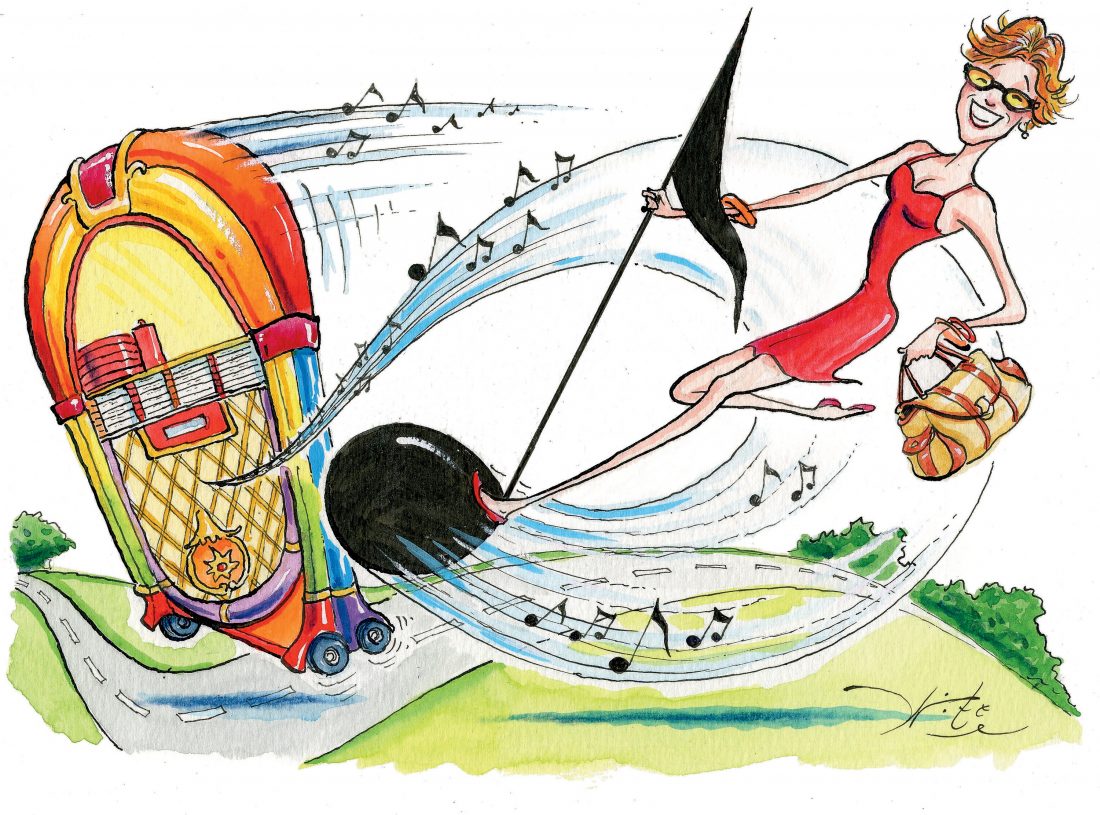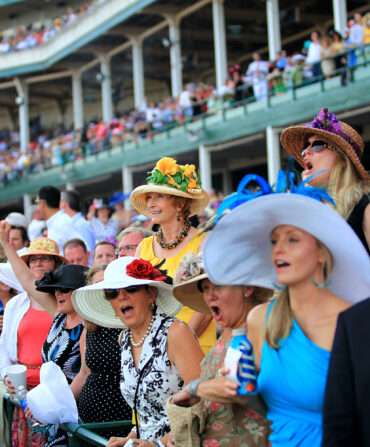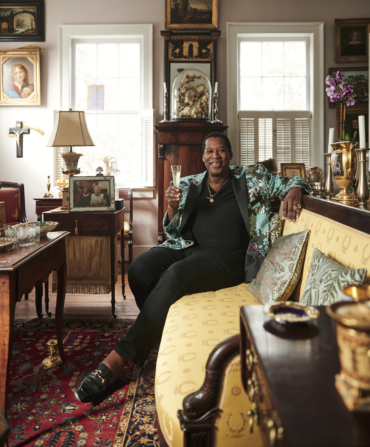In January, I attended a sixtieth birthday bash at the House of Blues in New Orleans, and since the birthday boy happened to be a billionaire, the entertainment was especially stellar. My buddy Harry Shearer, a very funny man (and the voice of about half the cast of The Simpsons), emceed the proceedings, which kicked off with a version of “Happy Birthday” by his wife, the Welsh chanteuse Judith Owen, that made Marilyn Monroe’s seem wholesome. Dr. John cut loose with “Right Place Wrong Time,” and Chrissie Hynde, looking and sounding at least as hot as she did when she first broke through with the Pretenders, did a set that included “Don’t Get Me Wrong” and “Back on the Chain Gang.” Gregg Allman was up next with “Statesboro Blues,” “One Way Out,” and “Melissa,” and the great Joe Walsh (who sang an especially ironic “Life’s Been Good”) closed the show with a rousing set that rocked the house. Or at least it should have.
Before I go any further, I should confess that I have never actually met my host. I was a guest of a guest, and a very lucky one at that, so I am trying to be very careful not to cast aspersions. But it was…weird. No one seemed to take much joy in the proceedings, or if they did it was seriously internalized. Though the party was held in what is essentially a big bar, the audience seemed airlifted in from Carnegie Hall. I mean, I learned to make out with the Allman Brothers on the stereo; there’s no way to listen to “Melissa” without the hair on the back of your neck standing up. I first heard Joe Walsh when I was ten and he was in the James Gang. Until he joined the Eagles, no one in that band could have pulled off that central guitar riff in “Life in the Fast Lane,” which he also played that night. There was some serious history—and not just my own—on that stage.
In contrast to the rest of the group, my friend and I spent the evening jooking around like maniacs—or, indeed, like normal people listening to a kick-ass lineup of some of the greatest and most storied musicians in the world. And we weren’t just the only ones moving, we were the only ones on our feet—except, of course, the musicians, most of whom were the oldest people in the room. Greg Allman is sixty-five and has a new liver; Dr. John and Joe Walsh have put enough bad stuff in their bodies over the years to kill a herd of water buffalo. But all three of them exhibited far more energy than the people they were playing for. But then, almost nobody in the audience, which included Bill Gates, was from the South. Apparently, folks in other regions do not spend the bulk of their youths in cars and bars learning about life and love and lust to the beat of a constant sound track.
Which leads me to the definition of Southern music. You could make the case that most music is Southern since the South gave the world jazz, blues, rock and roll, country, and the songs of Johnny Mercer. But I think you can also define music as Southern by the way you listen to it. In the car, of course, with the AC blasting and the windows rolled down, while banging out the beat on the steering wheel. Or in a club, while dancing the shag or the funky chicken or the gator or trying to do James Brown’s splits. It was the Godfather who said, “The one thing that can solve most of our problems is dancing.” My friend Humphreys McGee does an indescribable dance during the instrumental break in Rufus Thomas’s “Walking the Dog” that is such an intense expression of the good stuff in Humphreys’s soul he only does it every five years or so, lest he have a heart attack. When André Leon Talley saw Humphreys “walk the dog” at my parents’ house once, he pronounced it a “piece of Appalachian folk art” and said he ought to be in the Smithsonian. Humphreys himself says simply that the song allows “an opportunity to abandon all inhibitions and release my body to my id.”
The world would definitely be a better (or at least a more exciting) place if we all tried that every once in a while, but for starters you’d have to get up out of your seat. When I was eleven, I came home from school to find my mother dancing through the house while “American Pie” blared from our brand-new quadraphonic speakers. She was so into it and so oblivious of my presence that I was in awe and maybe even a tiny bit afraid, and I didn’t tell her I’d seen her until years afterward. My mother is a great, great dancer. I am not, but that has not kept me from dancing on bars and tables and in my kitchen by myself late at night. Mostly, though, I listen to a lot of music, and below I’ve created an entirely arbitrary Southern Playlist. If it were remotely comprehensive it would include additional acts ranging from Irma Thomas to the Avett Brothers, but I’ll get to them. Fortunately, I have a bit of time before I start planning my own sixtieth birthday concert (which will likely be broadcast via iPod).
Listen to Julia’s ultimate Southern playlist
“I’ll Take You There”
The Staple Singers
Former Stax Records executive Al Bell wrote this song in his daddy’s backyard after attending the funeral of his little brother. Much of its power comes from the Memphis Horns and the famed Muscle Shoals Rhythm Section (pay special attention to that bass line), but Mavis Staples’s vivid contralto provides plenty of competition. The song may have been written as a classic call-and-response gospel chorus, but she sings it like she is well on her way to a very different kind of heaven.
“Baby, Please Don’t Go”/“Gloria”
Van Morrison
Morrison is from Northern Ireland, but then so are a whole lot of people in the South. A cover of the Big Joe Williams classic “Baby, Please Don’t Go” was the A side of a single recorded by Morrison’s band Them in 1964, while “Gloria,” written by Van himself, was the B side. In his book Rock and Roll: The 100 Best Singles, Paul Williams writes that “here is something so good, so pure, that if no other hint of it but this record existed, there would still be such a thing as rock and roll.” The night I met my husband, who was in his former life the lead singer of a band called the Mersey Shores, he played “Gloria” on the piano, and it may well be the reason I married him. The song remains a perfect, raunchy, three-chord rock anthem and such a garage band staple that Dave Barry once joked that “you can throw a guitar off a cliff, and as it bounces off rocks on the way down, it will, all by itself, play ‘Gloria.’”
“Turn On Your Love Light”
Bobby “Blue” Bland
This is the kind of song that can—and will—change your life. Much of the intensity comes from the drums of John “Jabo” Starks, who went on to play for James Brown, but, man, it’s all there. “The chord changes, the solid horn section, the drum break—none of it has ever been equaled and certainly not surpassed,” says my good friend the artist Bill Dunlap, who was himself a drummer. “And then there’s Bobby’s plaintive call to ‘turn on the love light’ and ‘let it shine on me,’ which pretty much sums up the American dream—and which, in the South, always tended to be wetter than in other parts of the world.” Enough said.
“The Weight”
The Band
Robbie Robertson wrote this masterpiece—chock-full of biblical allusions and characters from bandmate Levon Helm’s Arkansas upbringing—after his first trips south to Memphis from his native Canada. “It was like, ‘Whoa, this is where this music grows in the ground, and [flows from] the Mississippi River,” Robertson told a reporter after Helm’s death last year. The gospel arrangement of “The Weight,” performed with the Staple Singers and featured in Martin Scorsese’s The Last Waltz, is guaranteed to make you cry.
“Ode to Billie Joe”
Bobbie Gentry
Forget all the mystery surrounding the events on the Tallahatchie Bridge; what “Ode to Billie Joe” really captures better than any novel is what happens around a Southern dinner table. And then of course, there’s Gentry’s deep/smoky/sultry/haunting voice.
“What’d I Say”
Ray Charles
I’m pretty sure Ray Charles never wrote a bad song, but if I had to pick just one to listen to for the rest of my life, this would be it. “What’d I Say” was born in 1959 at a dance in Pittsburgh where Charles and the band ran out of songs just before the end of a set that was contracted for four hours. “So I began noodling—just a little riff that floated into my head,” Charles explained years later. “One thing led to another and I found myself singing and wanting the girls to repeat after me….Then I could feel the whole room bouncing and shaking and carrying on something fierce.” It remained his closing number for the rest of his career.
“I’ve Got News for You”
Edgar Winter
Ray Charles wrote this song too, but I have to say I prefer this version. Edgar and his brother, Johnny, both albino guitar players with roots in Leland, Mississippi, are literally the whitest blues singers alive.
“Polk Salad Annie”
Tony Joe White
In addition to the Swamp Fox’s sexy, gravelly voice, this song features the immortal phrase “’Cause her mama was working on a chain gang,” as well as White’s “chomp, chomp” after the line about the gators getting Granny. Another classic recorded in Muscle Shoals, Alabama.
“Here Comes My Girl”
Tom Petty and the Heartbreakers
Petty, organist Benmont Tench, and guitarist Mike Campbell created a stone classic of a song. Heartbreaking in the best kind of way, it sounds like summer and sex and the first time you’ve ever heard that title line. Worth it alone for Petty’s “Watch her walk.”
“Sweet Home Alabama”
Lynyrd Skynyrd
Three words: “Turn it up.”








